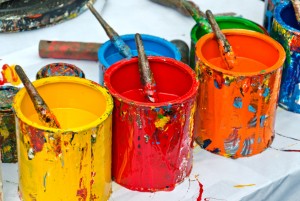 So you finally found the time, space and resources to build your own artist studio, and you want to know how to get started and what mistakes to avoid. Here a couple of tips to make sure your home studio remains pleasant and functional throughout your projects.
So you finally found the time, space and resources to build your own artist studio, and you want to know how to get started and what mistakes to avoid. Here a couple of tips to make sure your home studio remains pleasant and functional throughout your projects.
1) Lighting is everything
This seems so obvious, it’s a surprise that anyone would not consider it, but there is no overstating how important lighting is to art.
If at all possible, you should aim to flood your workspace with as much natural light as possible, even if that seems a bit overwhelming at first: it’s easier to throw some shade with curtains than it is to rip open new windows. Take care of finding out how the sun moves around your home during the day, as some rooms can consistently get more sunlight than others.
Now, “as much natural light as possible” may not exactly be “all the light I need”. This means, evidently, that you might have to buy some lamps in order to keep your studio functional whenever you need it.
When shopping for lighting, it’s a smart idea to go for directional lamps that will let you manage shadows and keep your project well lit from all angles. In order to free up space on your desk or the floor, you can also go for lamps that clamp on shelves or installed railings. And finally, you should choose bulbs that give off a white light to make sure the colors you use show up exactly as you’d like.
But all those lamps are only junk without…
2) Outlets!
Even for a relatively organic medium like oil painting, it’s never a bad idea to have plenty of spare electrical outlets around your studio.
For one, it makes the placement of various lighting sources easier, but the benefits don’t stop there: a well-powered studio will allow you to use electrical tools more freely, set up a computer and a printer for referencing, and leave a radio on to fill your head and environment with inspiring music.
As always, electrical appliances can mean additional clutter in the form of tangled wires. This can be especially noxious in an art studio: unsightly, inconvenient, dusty. To avoid problems down the line, sort and secure all loose wiring whenever possible, and always roll the wires of appliances that are not currently in use.
Now, speaking of securing…
3) Art is always worth protecting
A studio is undoubtedly an investment, and as an artist, you have the great gift of being able to create things of value. Protecting this wealth is a right and natural thing to do.
After setting up your studio, you should contact your home insurance provider and get coverage for any equipment you can not afford to lose. As artist supplies can be very expensive, this is an absolute must. If you mean to keep high value pieces in your studio, you can also get coverage for them individually.
And all of that will make for sounder sleep, at least financially, but really, the point is not to lose anything in your studio. To this end, it’s absolutely crucial to have functional smoke detectors, at the very least. Sprinklers can also be considered if your supplies are not water soluble, but keep in mind that water damage could potentially destroy your pieces.
The last step you can take to protect your studio is to install a home alarm system and subscribe to a 24-hour home monitoring program. Alarm systems have the obvious benefit of acting before the damage is done; and should be considered along with any home studio plans.
I know there are a lot of artists here at Life As A Human. If you have other words of wisdom to offer, please do so. I would love to hear them!
Photo Credit
Image is from fotolia
Guest Author Bio
Christophe Belanger
I am a freelance web consultant who has spent over a decade helping businesses improve their image and better manage their resources. You can find me blogging, commenting in many blogs and surfing on the Web but also travelling here and there and surfing on waves of water.
Recent Guest Author Articles:
- How Strong Business Training Translates Into Everyday Decision-Making
- New Career and Degree Paths for Educators Who Want to Make a Broader Impact
- Finding the Right Plumber in Portland: A Comprehensive Guide for Homeowners
- Why Choose Elara Caring for Jackson, MI Home Health Services?
- How I Turned Poetry into a Paycheck


Please Share Your Thoughts - Leave A Comment!